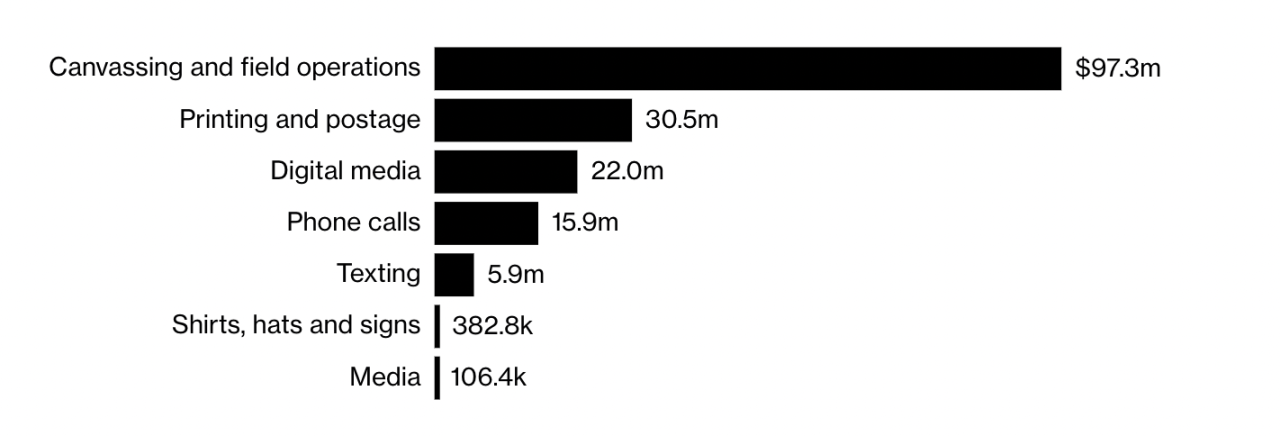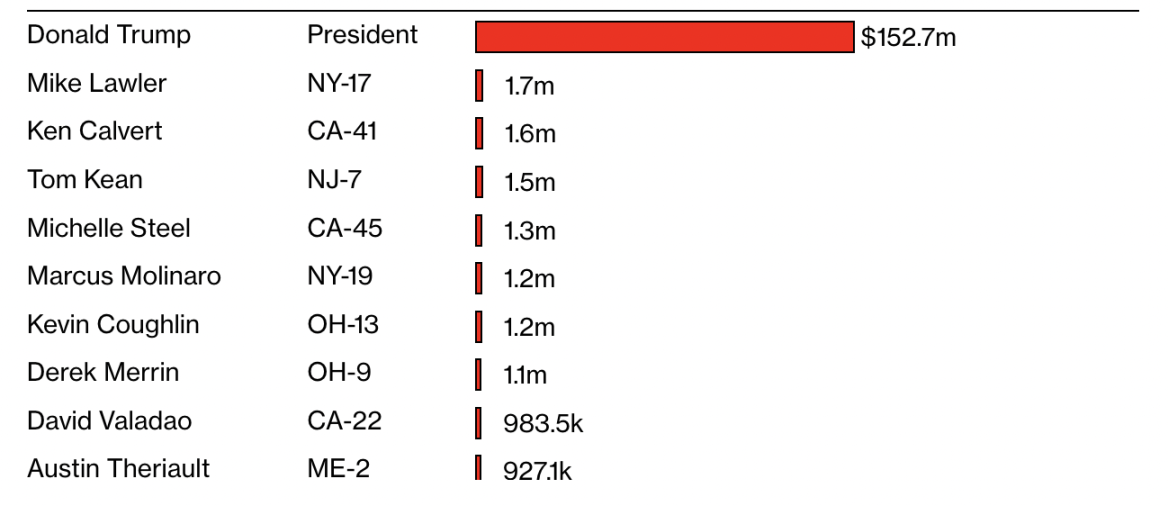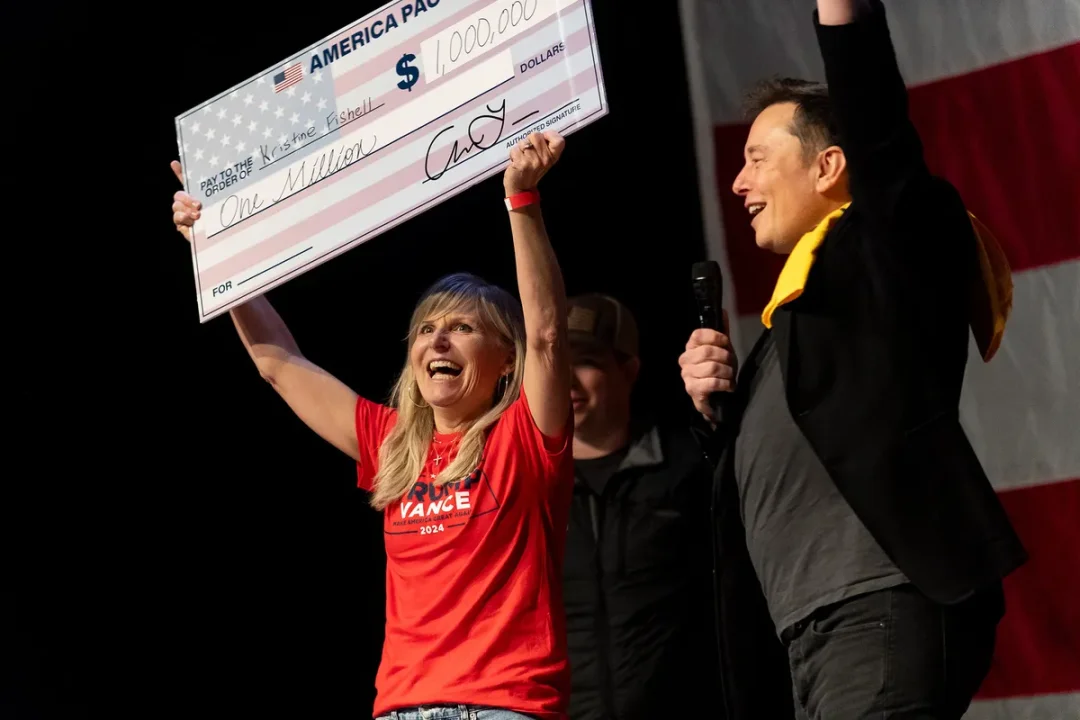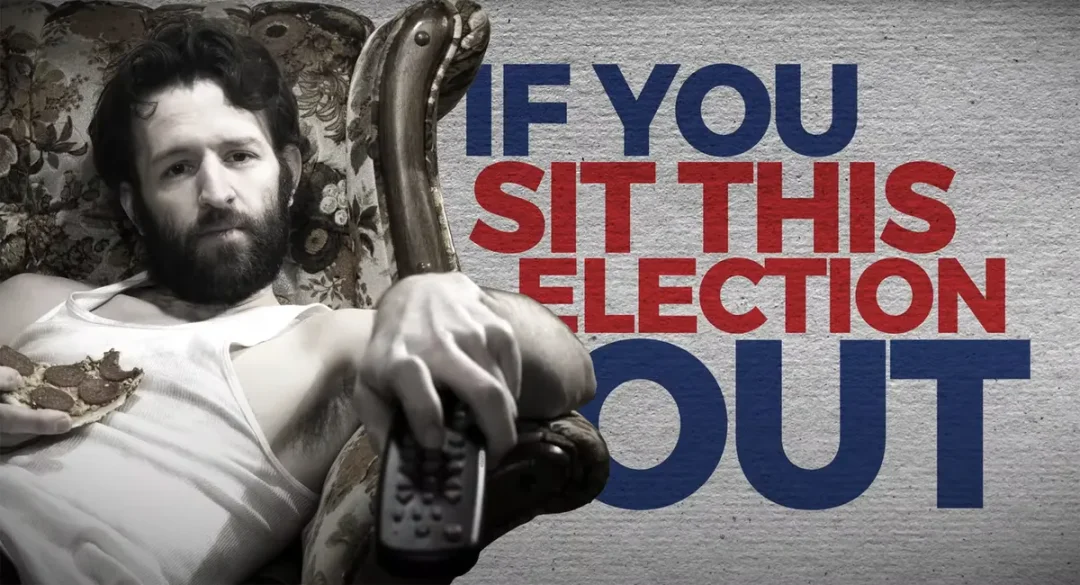Original author: Max Chafkin, Dana Hull
Originalübersetzung: Ruffy, Foresight News
Elon Musk was at a polling station in South Texas on the afternoon of Election Day before boarding a private jet to attend Donald Trump’s vote count party at Mar-a-Lago in Palm Beach, Florida. En route, Musk held an impromptu political rally. He posted a link to the livestream on the social network X. “Only a few hours left,” Musk said, as the plane’s engines hummed and about 100,000 people tuned in. “So make sure everyone is pushing their friends and family to vote, vote, vote.”
Before this year, Musk ran six companies: Tesla (electric cars), SpaceX (rockets), Neuralink (brain implants), Boring Co. (tunnels), xAI (AI chatbots), and X (Twitter). But in May, he added a seventh: America PAC, a political action committee that spent more than $170 million from its founding to the election.
More surprising was how personally Musk threw himself into the effort. He temporarily moved to Pennsylvania, where he traveled around the state, held marathon question-and-answer sessions in suburban auditoriums and turned his personal X account into a venue for rapid-fire responses to the right. Many of the jokes he circulated were sexist or racist or both. In the final days of the campaign, a large number of his posts expressed outrage over the euthanasia of a porn actor’s pet squirrel.

Musk PAC spending breakdown, source: Federal Election Commission
Musk’s signature combination of rebellious humor and “cheeky” behavior has worked, perhaps because Trump is the candidate who perfectly matches these traits. On Election Day, the former president, who has been impeached twice and convicted 34 times, not only mobilized the usual older white voters, but also added a new group that was younger, more diverse, and mostly male. In other words, people who like Elon Musk. “He lowered the bar for being a Trump supporter,” said Josiah Gate, vice president of political marketing agency Harris Media.

Candidates supported by Musk PAC, Source: Federal Election Commission
The Democrats have dragged almost every celebrity into this, Musk said during the livestream. They have a huge bias against traditional mainstream news. He told his audience that Democratic politicians are deliberately bringing in illegal immigrants to flood the swing states so theres really no real election. Like much of what Musk has said over the past two years, this is misleading at best. The immigrants he disparages in his conspiracy theory are not illegal immigrants, but asylum seekers who live legally in the United States, pay taxes, but do not have the right to vote.
Musk is clearly no underdog. His alliance with Trump is a classic story of power. One of the protagonists is a demagogic, domineering billionaire, and the other is an equally domineering billionaire who happens to be the richest man in the world. It is also a story about money. We don’t know the full amount of Musk’s financial contribution to Trump’s election, but it was at least more than $132 million, and probably $200 million when all is said and done. How much will these contributions pay off over the next four years? In the first three days after the election, Tesla’s market value rose 25%, and Musk’s personal net worth increased by $50 billion to more than $300 billion.

Musk presents Kristine Fishell with a $1 million check at Pittsburgh City Hall. Image credit: Getty Images
Trump promised a few things in return: rocket contracts for new missions to Mars, rules to support Musk’s upcoming self-driving taxis, and decisions in his administration about which government programs get cut and which get saved. Trump and Musk called this hypothetical policy package the “Department of Government Efficiency,” a name that came from Musk’s fondness for the abbreviation DOGE, the symbol for his favorite Kryptocurrency, Dogecoin. “He’s a special guy, he’s a super genius. We have to protect our super genius,” Trump said of Musk in his victory speech.
Soon, Musk may be given a more accurate title: oligarch. The term applies not just to him but to Jeff Bezos, Sam Altman, Sundar Pichai, Satya Nadella and a host of other corporate tycoons who have engaged in post-election posturing ranging from smirking adulation to outright groveling to get what they want from Trump. Their top concerns seem to include more favorable treatment for mergers (Nadella, Pichai), lax rules on artificial intelligence regulation (Altman) and avoiding retaliation for news published in their own publications (Bezos).
Will their efforts work? Trump’s track record doesn’t give them enough confidence. After Bezos decided to cancel his support for Kamala Harris, The Washington Post suffered a wave of cancellations, losing 10% of its subscribers within a few days. This suggests that executives and the investors who pushed up Tesla’s stock price have not fully realized the possible negative impact.
In the days after the election, Trump and Musk came into closer contact. Musk virtually camped out at Mar-a-Lago with Trump’s inner circle, appeared in family photos and joined Trump on calls with world leaders. So far, the president-elect has treated Musk as both a trophy and a confidant, not shying away from potential national security concerns, such as placing Musk on a call with Ukrainian President Volodymyr Zelensky or threatening to withdraw from NATO in retaliation for Europe’s attempts to regulate Musk’s company.

Musk and members of the Trump family at Mar-a-Lago. Image source: Kai Trumps Twitter
Meanwhile, Musk tweeted his usual strong support for Trump, suggesting he might fire 80% of government employees, abolish the Department of Education, and double down on his claims that the Federal Reserve is unconstitutional.
This frenzy will surely not last. And it must not last if Trump is to govern effectively.
Musk is talkative and quick-witted. At 53, he also understands the instincts of young men, perhaps because he behaves like a teenager in many ways. This may cause him to be at odds with analysts and investors, who do not see fart noises, 420 and 69 as comedy gold. They cannot understand that for Musk and his fans, boring is the point.
It may be hard for outsiders to realize that while Facebook was a commercial failure, it was a huge political success. Musk transformed a social media network that was not very popular into a distribution platform for right-wing media, fans and more than a few actual white supremacists. Facebook has lost a large number of users and advertisers, and caused the companys value to plummet by nearly 80% since its acquisition in 2022. But it still has a large young audience who are interested in Trump, sports, video games and cryptocurrencies. A November survey by YouGov Blue, a polling firm working on behalf of left-wing groups, found that men aged 18 to 29 mainly get news from social media, and Facebook is the most popular among them, surpassing YouTube and TikTok.
When Musk began funding the American Political Action Committee, he targeted this group. The group had three basic goals to help Trump: register new voters, encourage supporters to vote early, and get people to vote who might not otherwise. It deployed paid canvassers instead of volunteers and spent heavily on social media ads that played to the “edgelord” sensibilities of Trump’s audience. One 15-second ad begins with a bearded young man lounging on a couch as a gruff voice says, “If you don’t vote in this election, Kamala and the crazies will win,” before describing Trump as an “American badass.” Another ad warns that Harris will ban pickup trucks, red meat, and Zyn nicotine pouches. A third calls Harris “the C-word.” (The “C” stands for “Communist.”)

Musk PAC video ad. Source: YouTube
The PAC’s early days were chaotic. Operations staff complained about unpaid bills, erratic decision-making and violations of standard labor practices, echoing long-standing complaints from Tesla and SpaceX employees. Yet Musk’s efficiency was astonishing: Political campaigns typically take years to build, but Musk and his lieutenants recruited an army of 2,000 in just a few months. Andrew Romeo, a former adviser to Florida Gov. Ron DeSantis, ran North Carolina. David Rexrod, who worked for Virginia Gov. Glenn Younkin, ran Pennsylvania and Michigan. Chris Carr, Trump’s 2020 political director, ran Arizona and Nevada. Most campaigns try to save money by sending canvassers to more densely populated areas, where they can visit as many homes as possible. But a person familiar with the PAC’s operations said Musk’s money allowed governors to send canvassers to more rural areas, where Trump was able to boost votes. Musk’s PAC visited about 11 million homes, the anonymous person said.
Musk was lavish in other ways, too. When campaigns rent contact lists to send emails and texts to potential voters, they typically spend no more than $10 per lead. Musk built his own list from scratch. He offered $47 to anyone who referred a registered voter in a swing state to a PAC petition that asked for their email address and cellphone number. Musk later upped the offer to $100 for registered voters in Pennsylvania. Then he announced he was giving away $1 million a day to one lucky petition signer. The offer, arguably illegal, drew a lawsuit from the Philadelphia district attorney seeking to block the giveaway, but it also drew media attention. Musk’s petition eventually collected more than a million names. “That’s a nice number,” says Harris Media’s Gate.

Musk campaigned for Trump at Madison Square Garden. Source: Getty Images
But Musk’s most significant move was injecting his personal brand into the work of the PAC. On October 5, he showed up on stage at a Trump rally in Butler, Pennsylvania, at the site where Trump escaped assassination. He didn’t just speak; he jumped into the air, donned a black MAGA hat, and declared himself “Dark MAGA.” (The campaign immediately adopted the term, which means “Love Trump Too Much, Too Scary.”) Musk held a series of events across Pennsylvania, attracting young audiences who liked him but didn’t necessarily understand Trump. Then, on October 27, he showed up at Trump’s showcase rally at Madison Square Garden in New York City, where he was treated more highly than Trump’s running mates and his children.
The day before the election, Joe Rogan, America’s most popular podcaster, interviewed Musk, just as he had interviewed Trump the week before. “Here’s a message to men,” Musk said, and Rogan nodded in agreement. “Vote like your life depended on it.” Rogan, who supported Bernie Sanders in 2020, said he now supports Trump, and made it clear that it was Musk’s credit. “The great and powerful Elon Musk,” Rogan later wrote on X. “I thought he made the most compelling argument for Trump, and I couldn’t agree more.”
Musk wasn’t the only wealthy person to see his net worth increase in the days following Trump’s victory. The biggest winners included investors in private prison companies, cryptocurrency businesses, and nuclear energy producers. The idea behind these so-called Trump deals: Private prisons would benefit if Trump deported millions of immigrants; cryptocurrency values would rise if Trump built up his promised strategic Bitcoin reserve; and nuclear energy companies would benefit from Trump’s claims of building new reactors.
Musk’s own Trump deal follows a similar logic. During the campaign, Trump said his administration would fund Musk’s plans for a manned mission to Mars by 2028. That could value SpaceX, which has launched rockets for NASA and the Department of Defense, at billions or even tens of billions of dollars.
A more immediate potential payoff involves Starlink, SpaceXs satellite internet service. Musk has complained about being excluded from a $42.5 billion subsidy program passed during President Bidens term that would fund fiber-optic broadband in rural areas. Blair Levin of New Street Research, a telecommunications research firm, said the government could give some of the money to Musk instead of laying fiber.
Musk’s other dealings with Trump have also been speculative, bordering on the fantastical. Tesla’s stock price has risen seemingly on the theory that Trump will unilaterally legalize the company’s planned self-driving taxis. Musk made the claim during Tesla’s earnings call a few weeks before the election. “If there was a government efficiency department, I would do my best to help make that happen,” Musk said, adding that the regulations would apply to all car companies, not just Tesla. The problem is that Tesla hasn’t actually built a working self-driving taxi yet.
Moreover, while many Tesla investors fit the profile of a Trump voter or Musk fan, the people who actually buy Musk’s electric cars tend to be middle-class centrists who care about climate change. During the last Trump presidency, Tesla customers responded to his policy banning Muslim immigration by canceling orders, even though Musk had only an indirect relationship with the Trump administration at the time.
Then there’s the personal connection between Musk and Trump. Nearly every influential business leader who has become close to Trump has eventually been forced out of his orbit. The half-life of Trump’s influence is so brief that there’s a jokey abbreviation for “Scaramucci,” a reference to the 10 days that investor and former Trump confidant Anthony Scaramucci served as White House press secretary before he was fired in 2017. “People like Elon Musk are having a great time with Donald Trump right now,” Scaramucci said in a radio interview in early November. “But it’s only a matter of time before they’re going to have their hell moment with him.”
Even if Musk can hold out into the Scaramucci era, and even if his businesses can weather a customer boycott, neither Musk nor Trump are very popular. (An NBC News poll in late September put Musk’s approval rating at 34%; the FiveThirtyEight average as of Nov. 11 puts Trump’s approval rating at 44%.) If Trump were to follow through on Musk’s promise to cut $2 trillion from the federal budget, it would almost certainly involve cutting Social Security and some of the most popular government programs. That would provoke fierce opposition, not just from Democrats but also from Republicans, whose control over Congress would be limited even if they won the House.
Musk may behave like an elected oligarch, but the United States is not an oligarchy, at least not yet, said Bill Allison.
This article is sourced from the internet: Bloomberg: Elon Musks new business
Written by: Maia, BeWater Venture Studio TL;DR In terms of the issuance and application of BTC-anchored assets, centralized packaged BTC still occupies a dominant position of more than 75%. But at the same time, BTC LST represented by LBTC and SolvBTC.BBN has grown rapidly in recent months with the launch of Babylon, becoming another emerging force in the BTC-anchored asset market. The current BTC LST market size has reached 25.6 K BTC. Driven by the demand for interest-bearing underlying assets, the BTC liquidity pledge and points derivative market is gradually becoming a new growth point in the BTCFi field. @Coredao_Org is a L1 network driven by BTC, providing users with stable returns through non-custodial staking solutions and dual staking mechanisms. Its TVL has increased by 4757.9% in half a year…







